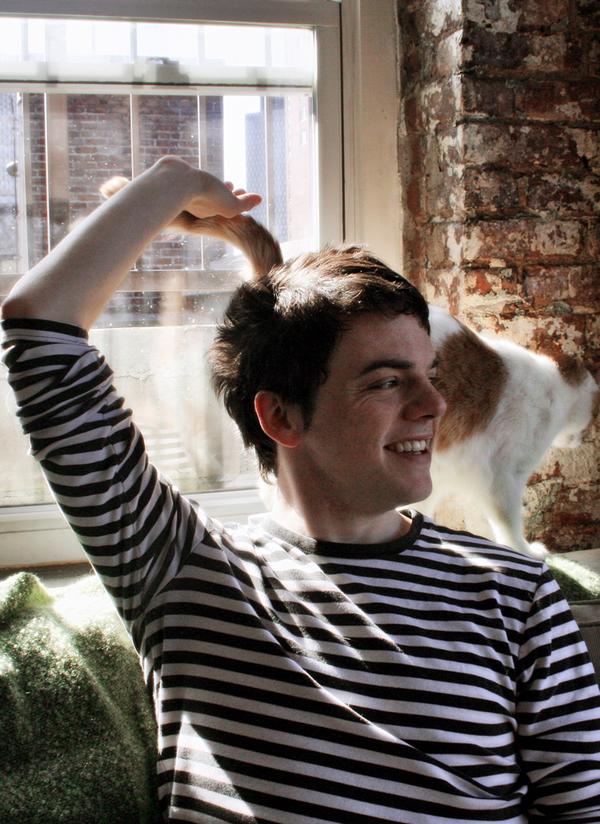Copyright ©2007 PopEntertainment.com. All rights reserved.
Posted:
July 24, 2007.
What type of person do you imagine when you conjure up someone writing and
arranging compositions for the likes of The Boston Pops, the American
Symphony Orchestra, The Juilliard Orchestra and The American Ballet Theater
(if you think about this at all)? Perhaps some crusty old geezer who farts
dust?
Well, prepare yourself
to be mildly surprised. Twenty-five-year-old Nico Muhly is no doubt young
and hip, New Yorky and – as The Kids say nowadays – groovy.
You may not know him because your head isn't there, but he's stirring up
quite a sensation in the world of classical and choral music (yes, there is
a scene), as a composer and arranger. He recently presented concerts of his
chamber music at Carnegie Hall and the Whitney Museum, and his canticles
were broadcast live on the BBC. He's also scoring movies as well as
prominent mentions in New York magazine and Time Out New York.
He has worked with the legendary Philip Glass as editor, keyboardist and
conductor for Glass' numerous film and recording projects, and he has also
arranged and conducted for that strange sensation from Iceland, Björk.
So how do you describe this music actually – how do you describe an artful
movement without making it sound like it was shoe-horned into a blurb in
Billboard magazine?
"Uncharitably, you can describe it easily," Muhly admits. "You can be pretty
mean. However, I think it comes out of Phillip Glass and John Adams. It's
about quirky and repetitive ways of being very expressive. Making
arrangements is literally like, here I am. Put clothes on me."
 His
love of this stuff came from childhood, when he joined a boys' church choir
and took a liking to choral music and Latin in the polar opposite way that
other children would rather die than eat liver or spinach.
His
love of this stuff came from childhood, when he joined a boys' church choir
and took a liking to choral music and Latin in the polar opposite way that
other children would rather die than eat liver or spinach.
Of that experience, he says, "It was something that – for lack of anything
else to do, I did – and then I just was all about it. The amount of music
that you go through is great. It was all memorized. It was all Latin,
figuring out religious words. We were also paid – not a lot. Forty bucks a
month. For a kid, that's a real lot. Our choir master was very stern and
very old-fashioned about a lot of things. We did a lot of new music, which
was good, and not a lot of sappy music. For me, it was a great thing to do.
I thought it was so amazing and so emotionally compelling. Working through
rules to tease out true emotion. That is true for many types of music,
especially the minimalist ones. A lot of people think that it's really
sterile. I'm attracted to what is under the surface."
This quirky first love also lead to his mastering the keyboards and his
passion for composing. He says, "That combination of singing [in the choir]
and playing really clicked. And I started writing a lot."
Not too shocking for a dude who started out in Providence, Rhode Island and
attended classes at Harvard while still in high school (he had to hop a bus
to do so). His father is a documentary filmmaker and an amateur Egyptologist
and his mom is a painter. Not hippies exactly, but, as Muhly explains them,
"They're older than hippies. It was more like 'back to the land.' We grew
our own shit and we sold lambs. I like to think of it as 'more informed'
than hippies.
"We [briefly] lived in Italy, in Rome, and I was randomly given this studio.
An empty room with a piano and a desk, so I started writing there. And when
I got back to the States, I got this job doing midi-sequencing for Phillip
Glass. I somehow managed to barter with him – a little bit of health care,
and a little bit of money and a space in return for the work."
He also stuck up a professional bond with Björk and her management, which
helped produce his first solo CD, called Speaks Volumes (Bedroom
Community Records). This lead to a warm reception from music critics and a
toasty association with what is perceived as a very cold place.
"It's great," he says of his love for Iceland. "I've been there now more
times than I can tell. Six or seven times a year. It's like 300,000 people,
like the Upper West Side. It's super intimate. Everyone knows everyone.
Everyone speaks English. Their [native] language is so hard, it's out of
control. Their [language] rules don't make any sense at all. Everyone has
kids with a million different people. The idea of a custody dispute doesn't
even come up. It feels so progressive."
 Speaking
of which, he has scored the music for an episode of the MTV2 series
Wondershowzen as well as for the 2007 indie movie Joshua. Of the
adventure of scoring a film he says, "They gave me a lump sum of money from
which I did everything, which is good because I didn't have to get every
decision approved." However, with scoring a film, "you are constantly
existing in a state of compromise. I can only do it now and again."
Speaking
of which, he has scored the music for an episode of the MTV2 series
Wondershowzen as well as for the 2007 indie movie Joshua. Of the
adventure of scoring a film he says, "They gave me a lump sum of money from
which I did everything, which is good because I didn't have to get every
decision approved." However, with scoring a film, "you are constantly
existing in a state of compromise. I can only do it now and again."
For Muhly, his dedication to the art is not monetarily based or growing
stale anytime soon. It's completely connected to his love of "text and
language games," he says. "When I was in school, I was taking Arabic. You
take the root of a word and then you add things to it. It's basically
rhythmic manipulation. Number one is the text. That is the most critical
thing for me. Number two is energy. I don't think too much about style. I
don't say, 'I'm going to set out to do this.' The way that emotion works in
sixteenth-century British choral music is that the texts are religious texts
and everyone knows them. There is no surprise in the text. There are a lot
of rules."
Muhly then loves to play by those rules and occasionally break them. He's been
doing this since his very first piano lessons as a young boy. He recalls,
"When you first learn to play the piano, the music they make you play is the
worst. It's all this cheesy, Disney'd-out stuff. The universe it describes
is totally uninteresting to me. Like, 'look at the little sparrow!' It never
registers, and it never represents to people now."
Speaking of representin', will he be writing for The Kids anytime soon? He
says, "The craft of writing popular music is so efficient to me that I don't
think that I can ever do it. It's like being a professional swimmer, where
you have to do everything in formal ways."
Yet doesn't he want to sit at the cool lunch table? Would he like his music
to be more popular? After a quarter-century of marching to his own drummer,
would it even matter to him? He answers, "It does and it doesn't. I want
people to be attracted to it. And yet I feel like I have a lot of
unattractive things to say that I'm holding out on."
For now, he's holding on in New York City. He says, "The energy of it is so
appropriate. I just moved. I had this illegal sublet on the Upper West Side
for like a million years. It was so absurd. We were evicted on New Year's
Eve. Then I moved to the craziest, craziest street in Chinatown. Chinatown I
love. It's so 24/7."
While the music of life plays in the streets of Chinatown, the music in his
head gets composed and then decomposed and re-arranged. Does he always wind
up on paper with what has been spinning around in his head?
"I do," he replies. "The more I do it, the better I get. I feel like 95%
should be a good goal, and then the other five per cent should be a bonus."
Email
us Let us know what you
think.
Features
Return to the features page.

Copyright ©2007 PopEntertainment.com. All rights reserved.
Posted:
July 24, 2007.